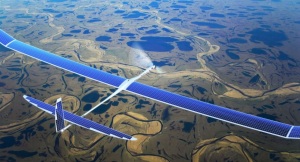Facebook has bought a Somerset-based designer of solar-powered drones for $20m (£12m) as it goes head-to-head with Google in a high-altitude race to connect the world's most remote locations to the internet. Mark Zuckerberg, Facebook's chief executive, has unveiled plans to beam broadband connections from the skies, using satellites, lasers and unmanned high-altitude aircraft designed by the 51-year old British engineer Andrew Cox.
His Ascenta consultancy will become part of Facebook's Internet.org not-for-profit venture, joining a team of scientists and engineers who formerly worked at Nasa and the US National Optical Astronomy Observatory. Facebook is building its Connectivity Lab as a direct challenge to Google's Project Loon, which is launching high-altitude balloons over New Zealand and hopes to establish an uninterrupted internet signal around the 40th parallel of the Earth's southern hemisphere.
The race to put the first man on the moon was led by the US and Russian governments, but today it is private companies – the cash-rich digital corporations of Silicon Valley – that are driving the sub-space race. The ambition is to connect the billions of people who currently have no access to the world wide web. "In our effort to connect the whole world with Internet.org, we've been working on ways to beam internet to people from the sky," Zuckerberg wrote on his blog. "Today, we're sharing some details of the work Facebook's Connectivity Lab is doing to build drones, satellites … and lasers to deliver the internet to everyone." "Our team is actively working on building our first aircraft now," Zuckerberg said in a paper published yesterday. "Key members from Ascenta, whose founders created early versions of Zephyr, which became the world's longest flying solar-powered unmanned aircraft, will be joining our Connectivity Lab to work on these aircraft. We expect to have an initial version of this system working in the near future."
With 1.3 billion users, Facebook has already reached a large number of the estimated 3 billion people who use the internet. Connecting the other 4 billion will hugely expand its potential user base. In what the Internet.org website describes as "one of the greatest challenges of our generation", engineers are trying to solve the problem of beaming fast, responsive internet signals to and from the Earth's surface from heights of 20,000 metres. Facebook is exploring the potential of two types of craft – satellites, which could be used in remote rural locations from the Highlands of Scotland to the Amazon basin, and drones, which would fly over suburban areas. Yael Maguire, an Internet.org engineer, explained: "In suburban environments we are looking at a new type of plane architecture that flies at 20,000 metres, at the point where the winds are the lowest. It's above commercial airlines, it's even above the weather. They circle around and broadcast internet down but significantly closer than a satellite."









0 comments:
Post a Comment